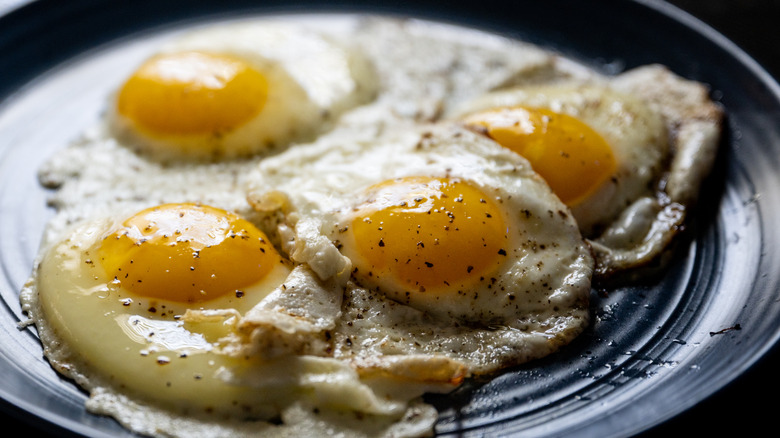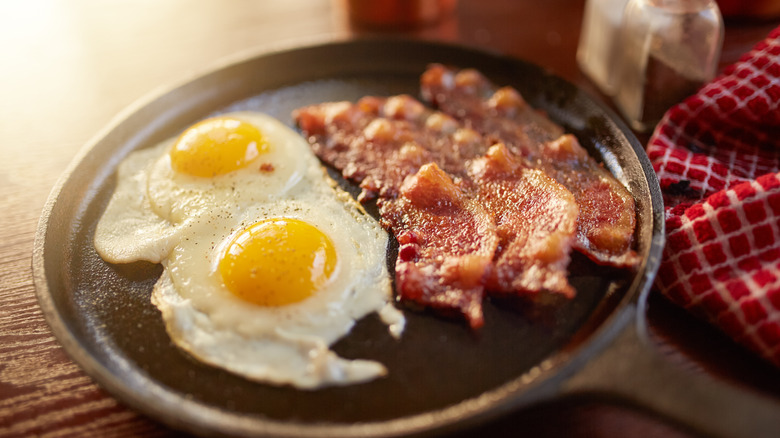Leftover Fat Is The Secret To The Best-Ever Fried Eggs
There's really no wrong way to fry an egg (sunny side or otherwise). So long as you have a frying pan or griddle and a heating source, you're pretty much halfway done making breakfast. But just because frying an egg is easy doesn't mean it can't be improved. If you want a fried egg that will rival even the best diner-style breakfast special, you're going to need some fat.
Any kind of fat will do. If you have some shortening or lard laying around, that will work perfectly fine. If you want some sausage links or some bacon with your eggs, fry them up in the pan first and save the leftover grease or fatty bits that are left behind. Whatever kind of fat you use is totally up to you, so long as you have enough of it to coat the bottom of your pan. Although various accounts may differ in exactly how much fat you should use – culinary scientist Jessica Gavin suggests using 1 teaspoon while others may suggest using 1 tablespoon — you're free to use as much fat as you'd like, so long as it's enough to give your pan that slick, almost shining coating.
Once your choice of fat is properly melted into the pan, you can fry your eggs as you usually would until the edges are golden-brown and the yolk has set. The end result, you'll be sure to find, is that you'll have a richer, more flavorful egg.
The fat influences the taste and health content of the egg
It should come as no surprise that frying an egg in a little bit of bacon grease or those little brown bits left behind when you're frying sausage makes it taste better. The egg absorbs some of that flavor, giving it a somewhat saltier, almost meaty taste that also doesn't overpower the natural flavor of the egg. If you don't like the flavor of egg whites or the yolk, frying it in some leftover fat makes it taste a little bit better.
Of course, depending on the type of fat you're frying with, the health benefits of the egg begins to vary. For example, compare an egg you fry with a lighter oil to an egg you fry with bacon grease. It may not come as a surprise that the eggs fried in bacon grease will have higher fat content and cholesterol compared to an egg that's been fried without grease.
Almost any kinds of fats can be used to fry your eggs. You can use everything from duck fat, beef fat, lamb fat, or even brown butter leftover from baking as a good substitute for bacon fat.
How can you store leftover fat?
Let's say you just finished a breakfast of bacon and bacon-fat fried eggs, and now you're left with a considerable amount of leftover fat. If you choose not to dispose of it, is there any way you can save the fat for later use?
If you want to store your leftover liquid fat, all you need to do is strain the grease through a filter into the container of your choice. The filter helps to remove any debris or waste left behind in the grease, which will spoil or contaminate your fat as it solidifies. You can then store it in either your fridge or your freezer. It's important to note, however, that storing fat in the fridge gives it a shelf life of a few months, while freezing makes it last much longer.
Of course, like most any ingredient, fat can go bad. The first sign fat has gone rancid will most likely be a change in smell. Rancid fat will have a sour, unpleasant odor and a discolored appearance. If your fat looks or smells off, it's best to dispose of it immediately. Fats like leftover bacon grease or beef tallow can have a long shelf life if stored properly, but you should save only as much as you plan to use in the future.

